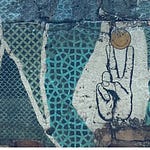“Randy, is it a good idea to quit on January 1st?” My standard answer isn’t what everyone wants to hear:
“I don’t know. It depends. What I do know is that a hard thing is going to be hard no matter when you do it.”
And while I have plenty to say about the pros and cons of picking January 1st as your sobriety date, I’m approaching the question from a different, more personal angle this year. I’m conducting my own experiment. Meaning, I’m picking that date to quit a thing. Specifically…
I’ve handed in my resignation and will not be renewing a contract that’s provided financial security for the past few years.
Watch the video for this episode on YouTube
Now what?
The ol’ reliable Voice of Fear says:
“Hey, you tried this before and it didn’t go so well. I don’t think this is a good idea. You better try and get that gig back. Beg, present new facts, manipulate your way to return into the Arms of Safety. I’ll help!”
Ah, the familiar and the safe. Another question that I’m asked as often as whether to quit on January 1st is:
“Why would I choose to stay the same and pick what’s familiar when I know it’s not healthy? Especially when I know that the option of ‘going for it’ and moving forward is the right thing to do?”
Well, the unknown is scary. So, the Voice of Fear makes a lot of sense. It provides practical advice that overrides those nagging intangibles like hope, faith, and possibility—even in the face of an obvious chance to change for the better.
Unfortunately, this kind of practicality can also serve as the cement that solidifies a cycle of addition into perpetual incarnations.
What’s better, really?
What’s better, really? A cycle of safety and familiarity or jumping into the unknown and creative possibility.
What’s different and what’s the same?
Chances are, if someone’s picking January 1st as their target date to quit something, they’ve tried this before. And if they’ve tried it before and are doing it again, that means the previous attempt(s) were unsuccessful.
We’ve got to acknowledge this and put all the cards on the table. What are we dealing with here in terms of prior failures—whether perceived or objective?
Because don’t set up your January 1st quitting plans thinking that this time willpower will overpower the Voice of Fear.
That’s a nightmare doomed for collapse. In one form or another, it’s probably what you tried (and failed) before. One reason is because it’s what I call the “Me vs. Me” scenario. Meaning, we have my willpower fighting my Fear.
Ugh. Nothing but struggle. That’s exhausting and, chances are, this is one answer to the question: “What’s the same?”
So, let’s set up a different plan and one more likely to meet with success.
If you’re quitting, here’s a map of the territory.
I start with the model that’s worked for the last couple of decades with myself and my clients. It’s also the one I use in The Sober Shaman’s Path of Recovery.
This model is based on the first of my 3 Principles for dealing with addiction, which states:
Addiction affects the whole person: mental, spiritual, emotional, and physical.
Pretty simple. Each of these four aspects of the whole person offers its own perspective on the issue, speaks its own language to describe the situation, and will employ its own medicine to deal with imbalances.
That in mind, let’s apply them to our January 1st quitting.
Here’s the Checklist of the Four Medicines and how we’re going to use them to support success:
Mental
It’s not complicated. People try to change for two reasons: to get more pleasure and to receive less pain. That’s pretty much it.
So, taking inventory of this January 1st quitting:
What new awareness do you have around the pain, and what is the new pleasure you expect to receive?
Action Item:
What methods will you employ to receive new awareness?
These can be:
* Traditional therapy, counseling, or coaching
* Meditation
* Groups specific to your situation
* Your own investigation through reading, podcasts, courses, and programs
* Asking Spirit—such as through a shamanic journey or traditional or individual rituals in relationship with your helping Spirits
* Asking Nature—spending quiet alone time and receiving answers
Spiritual
To keep things simple, I like to say that what we believe is the primary factor determining our spiritual identity and how our relationship to the Divine manifests.
Belief is also a primary factor in how we approach quitting something. Thus, belief offers a link between our spirituality and our quitting. They’re absolutely intertwined.
When we attempt to make a big change and break a long-running cycle, we will inevitably confront our own limiting beliefs:
What beliefs does quitting your thing force you to confront?
“It takes a new experience to change an old belief”
—The Sober Shaman’s Path to Recovery
Action Item:
How will you provide yourself with new experiences that validate your new beliefs—and prove your outdated limiting core beliefs incorrect?
Whether religious or spiritual, atheist or animist, be clear about your beliefs and use them to your advantage.
The medicine of experience will always affect your beliefs—whether it validates and strengthens them, or shatters them apart to reveal new truths.
This can look like:
* All of the suggestions above, under “receiving new awareness,” also provide experience.
* Pilgrimage to sacred places (which could be sacred just to you—such as the house where you grew up, etc.)
* New ways of praying or reintroducing an old way of praying
Emotional
Once you’ve got your methods for gaining awareness and exploring beliefs, take it up a notch by connecting with others who have kindred goals.
Action Item:
Who will be your connections?
What interests you?
Where will these connections take place?
For example:
* Connection to movement
* Connection to food and nourishment
* Creativity and creative outlets
Physical
A practice is something that you do everyday. Regardless of whether you “feel like it,” you just do it. Chop wood, carry water. Day in, day out. Wash, rinse, repeat.
Just do it.
This is where willpower is employed and we work the muscle of self-discipline. But, it’s different than “just willpower.” We now have the three new medicines of awareness, experience, and connection supporting it.
We’ve also got a reframe up our sleeve:
We’re not setting up “willpower against the thing to quit.” Rather, we’re setting up willpower for doing the next right thing.
We start with the smallest of steps: Pile up the “little wins.” Don’t tackle a buffalo everyday or you’ll eventually get trampled (this is what usually happens when people fall off the wagon, blame it on weakness and flimsy willpower, and quit the quitting).
Instead, accumulate those small daily wins.
Action Item:
* Make a gratitude list at the end of each day to provide a sense of accomplishment and/or at the beginning of each day as an acknowledgement of your capacity to move through the day with the ability and opportunity to change for the better.
* This gratitude then allows you to touch others in ways that you would not have otherwise.
* Relationships: How does “not doing your thing” change the way you interact with others?
* Bring awareness to these new interactions.
* Receive the new experiences.
* Strengthen the new connections.
* What do you do instead of doing the thing you’ve quit?
Big Medicine
All of this creates the muscle of repetition. And whether you look at what this practice and repetition does to you with a brain scan offering evidence of new neural pathways…or through how experience solidifies your spiritual beliefs…or how connections enrich your life, it’s Big Medicine.
Take note:
What’s different about all of this compared to the last time you quit?
Whether you’re quitting a substance, a behavior, or “just” the comfort of the familiar (like me, with financial security), all four medicines apply.
Addiction affects the whole person: mental, spiritual, emotional, and physical.
Regardless of your drug or action of choice, religious or spiritual beliefs, skin color, culture, identity, sexual orientation, or financial and/or societal situation, every aspect of your whole person has been affected by whatever it is you’ve decided to quit.
The flip-side is also true: Quitting will affect all four aspects.
So, in preparation for your January 1st decision, let me ask:
* Do you have all four aspects of your whole person covered?
* If not, what’s missing?
* What’s the same as last time?
* What’s different?
* How can you use this information to your advantage?
* Is quitting on January 1st a good idea?
I don’t know. It depends. What I do know is that a hard thing is going to be hard no matter when you do it.
I also know that the odds can be tilted in our favor. We can make the hard thing a bit easier, and who knows? Maybe it will even be fun when we pile up the little wins and have the support of the four medicines.
How about you?
Are you quitting something this January 1st? What is it? How’s your checklist looking?
Share and inspire in the comments! And if you’d like ideas, find some resources here.
No matter what path or approach you take, don’t leave out any aspect of the whole person. They all constitute you. And they all have the capacity to help you break unhelpful cycles and find a new, more supportive version of “familiar.”
With All Good Medicine & Wishes for a Happy New Year,Randal
Get full access to The Sober Shaman at randallyons.substack.com/subscribe















Share this post